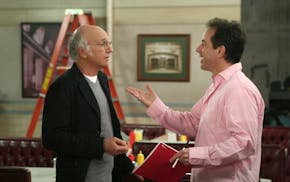LOS ANGELES
It began as a dreamy Hollywood story: A small-town Minnesotan moves to Tinseltown, gets plucked out of obscurity by one of the industry's giants and becomes a star overnight.
But the tale takes a cruel twist.
As depicted in the new film "The Girl," premiering Saturday on HBO, Tippi Hedren's string of success in "The Birds" and "Marnie" came unraveled under director Alfred Hitchcock's sexual harassment and maniacal treatment of an actress he had planned to turn into the next Grace Kelly.
"All those years ago, it was a studio kind of situation. Studios had all the power," said Hedren, 82, taking a break from her California animal preserve, where she has lived for more than two decades. "In the end, there was nothing I could do legally about it. If this had happened today, I'd be a very rich woman."
In the film, Hedren is portrayed by Sienna Miller, who has the naive Midwesterner persona down pat, gazing at a framed photo of Kelly in the studio waiting room and being utterly charmed by Hitchcock (Toby Jones), who insists at their first meeting that she call him "Hitch" and pours her red wine with their lunch.
But there are early, crude hints that the director has more on his mind than making movies. During her first audition, he makes her strut around the set like a lap dancer and make out with an all-too-willing Martin Balsam. He tells dirty limericks that would make Howard Stern blush. And that's all before she rejects his awkward pass in the back seat of a car.
From there, it gets much worse. The film suggests Hitchcock deliberately sabotaged the famous phone booth scene from "The Birds" so that the glass would shatter in Hedren's face. For the final attack scene in a second-floor bedroom, she assumed the crew would continue to use mechanical birds. Instead, Hitchcock substituted real gulls, ravens and crows that battered and bloodied the actress over the course of five days.
That episode was re-enacted by Miller. "It was certainly difficult shooting certain scenes, but not nearly as difficult as it was for Tippi," said the actress, who consulted Hedren several times during filming.
Hedren reluctantly agreed to do a second movie with Hitchcock -- winning a Golden Globe for "The Birds" and landing Sean Connery as co-star helped seal the deal -- but by the end of production on "Marnie," Hitchcock was telling her she would have to start serving as his sex slave. Hedren refused to work with him again and Hitchcock refused to let her out of her contract.
Reliving that traumatic time wasn't easy. Hedren watched "The Girl" with 30 of her friends, including her daughter, actress Melanie Griffith.
"At the end of it, nobody moved," Hedren said. "Nobody said anything until Melanie jumped up and said, 'Now I have to go back into therapy.'"
Hedren credits her parents' Swedish-Lutheran background and Midwest upbringing in New Ulm, Minn., for giving her the strength to survive such an abusive relationship.
"They gave me a good basis of moral standing of what's right and wrong -- and you don't let the wrong happen," she said. "Those things have served me well. I fear very little. That film made me think more of my upbringing and the strength that I got."
Hedren's showbiz roots also have served her family well. Griffith won a Golden Globe of her own for "Working Girl" and granddaughter Dakota Johnson now stars in the Fox sitcom "Ben and Kate."
Hedren would go on to appear in more than 50 films and TV projects (she and Griffith cameoed on the season premiere of "Raising Hope"), but after "Marnie," she never again got to play a leading lady.
"I feel strong. I lived through it beautifully," she said. "He ruined my career, but he didn't ruin my life."
njustin@startribune.com • 612-673-7431 Twitter: @nealjustin

CBS will turn the lights back on for Billy Joel concert

TV to watch: Billy Joel offers concert for those of us who aren't big shots

Justin: 10 TV shows about the Founding Fathers that are more fun than Apple's 'Franklin'

TV review: Robert Downey Jr. spoils 'The Sympathizer'


